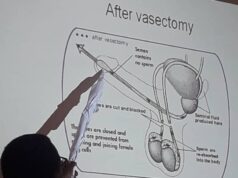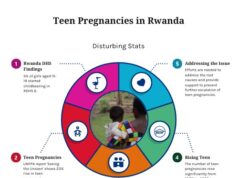
Patriarchal beliefs of male, heterosexual dominance and the devaluation of girls and women lie at the root of gender-based leadership.
Patriarchy is a structural force that influences power relations affecting women politicians in Bungoma.
In this report, Ridah Chebet examines how gender dominance discourages women from political
participation, with the report throwing up likely solutions.
She is a beam of happiness and excitement. She had agreed to meet me at her office in Bungoma County, at midday and she was already seated and waiting, calmly taking in the tranquil of the decorated office at county headquarters.
It is difficult to believe that she is the first woman deputy governor of a county of an area of 2,069
km2, nine constituencies and a population of 1.7 million of which more than half are females.
It was smiles when she sighted my presence together with my camera person from Maisha Television
Kenya. Her demeanour illuminated the incredible leadership nuggets and softened her solemn-looking face as well as revealing white even teeth.
She stood up and greeted my reporter and me as she made us comfortable in her office, well guarded
and warm deftly responding to questions.
Pastor Janepher Mbatiany was elected the Deputy Governor of Bungoma County in the western region of Kenya under Ford Kenya Party in the 2022 general election.
Pastor Janepher Chemutai Mbatiany holds an Arts Degree in Gender, Women and Development and an additional degree in Theology from Egerton University. She served as Gender Advisor in Governor Kenneth Lusaka’s office between 2013 and 2017 and her passion to serve people by addressing their needs saw her join politics
Ms Mbatiany who in 2022 contested for deputy governor for the Bungoma gubernatorial seat with
Governor Ken Lusaka on the platform of the Ford Kenya party ticket, said she joined the party in a bid
to foster proper representation of women at all levels, to upsurge constitutional mandate of
a proportional representation that all elective and selective positions had to be 35 per cent especially
allocated to women.
The discussion soon narrowed down to how patriarchal politics was not favourable to women. She
said that the electoral process in Kenya and particularly the western Kenya region was not only very
expensive, but the belief that only men must lead is detrimental and it negatively affects women
politicians.
She said that currently there is no single elected woman as a member of the National Assembly in
Bungoma County and this is attributed to male dominance of political systems, culture and the
economy, not to mention threats of violence, educational stipulations and gender stereotyping.”
Kenyan women over the years have shown keen interest in leadership positions, but so many barriers
limit them, as much as they occupy executive positions in local and multinational companies, the
political space continues to be elusive to many of them.
From a gender perspective, three vital lessons can be learnt from the 2022 general election. First,
gender issues are on the rise, a fact shown, not least by the appointment of the first-ever women
running mates for one of the two main presidential candidates.
Second, although the ratios of women representatives at all levels are slowly but steadily increasing,
the gender quota is just window dressing, which the parties blatantly ignore or work around by
nominating women candidates to top-up lists.
Third, violence against women in politics poses a serious threat to women’s political inclusion and
citizenship.
Patriarchal attitudes and structural barriers in Kenya’s political institutions disadvantage women,
reducing the pool of candidates and the number of those elected despite robust legislation through Kenya’s 2010 Constitution, which supports women and ensures gender equality, during the August 2022 general election.
A total of 1,962 female candidates were cleared by the Independent Electoral and Boundaries Commission (IEBC) to vie for different seats in the 2022 elections out of a total of 14,137 candidates a number that is still a drop in the ocean. The major reasons for that included self-doubt (despite women having considerable professional experience and skills) and a lack of consent from potential candidates’ husbands (they often fear that they will not have enough time to look after their children and run the household, and see political activity as a threat to doing business and personal safety).
Eleven years after the promulgation of the Constitution of Kenya (2010), women are asking what is
there to celebrate when several gains in women’s representation and participation in leadership continue to be eroded, ignored and replaced with self-serving interests?
“How do we celebrate when the two-thirds gender rule has not been fulfilled in all arms of government not even in the county assemblies where only eight counties are compliant meaning thirty-nine are not!” was the powerful reflective question posed by Hon. Martha Karua during the
“Women Must Lead” Policy Dialogue held on 28th August 20202 in Nairobi, Kenya. The Dialogue
organized by the African Women’s Development and Communication Network (FEMNET) in
partnership with International IDEA and WPP Consortium partners brought together close to 30
women leaders to reflect and strategize on women’s political participation in Kenya.
former Trans Nzoia woman representative Janet Nangabo, Speaking at the Kitale women’s GK Prison,
challenged women in the region not to fear contesting against men in all the elective seats in the
2022 polls. Mrs Nangabo expressed concerns that a little number of women in the region have
shown interest in elective politics with hopes of being nominated.
Besides Julia Ojiambo, the first woman to be elected MP in Western in 1974, Christine Mango, who
was Butula MP between 2002 and 2007, and Mary Emase, Teso South MP few women have dared
try national politics.
Former Bungoma Woman Rep Reginalda Wanyonyi who was seeking to recapture her seat in the last
general elections speaking in an interview with KTN NEWS said women stand a better chance to win
parliamentary, senate, governor and ward representative seats. but….“Culture and lack of respect for
women have been a major problem in Western, but slowly we are overcoming that. We have female
politicians who have declared interest in top county jobs and MP seats already, ”
Ms Wanyonyi cited ignorance among women and fear of violence as factors that have eclipsed
female politicians in the past.
“We would like political parties to open up and create a friendly environment for women to take
leadership positions. I believe 2022 will be the beginning of the female politicians’ breakthrough. We
shall not let men take away everything,” said Wanyonyi.
According to her, some women in leadership positions have also suppressed the voice of a budding
female politicians.
women from the western region in Kenya have decided to be at the forefront of fighting for women’s
rights through their group western union for Change, they accused the elected women of neglecting
emerging issues that affect women directly and focusing on their ambitions
in their first meeting held in Busia County the group discussed their mission which is to bring change
to women in terms of representation and financial freedom through their table banking
program, according to the women the retrogressive culture has made many women shy away from
change hence there is a need to empower them through various projects
How do we end this? increase awareness across the country about women’s rights and the attack on
patriarchal attitudes, recognizing women as political subjects, ending violence against women and the
denial of their rights, deconstructing the sexual division of labour, and speeding up women’s economic
empowerment and enhancing their participation in labour markets.
This story is part of the African Women in Media (AWiM)/Luminate Young Women in Politics Media Project.













